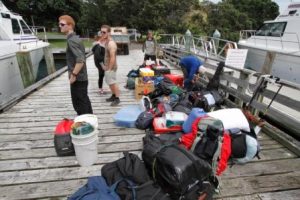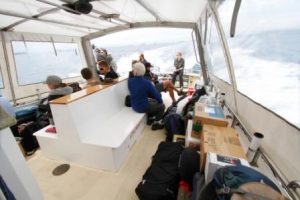 We’re here on Great Mercury Island after months of planning. This morning we awoke to rain and travelled to Whitianga with no improvement to the precipitation or greyness. However as we approached Whitianga the rain stopped and the situation improved through the day. By early evening there was blue sky and sun, which bodes well for the next few days.
We’re here on Great Mercury Island after months of planning. This morning we awoke to rain and travelled to Whitianga with no improvement to the precipitation or greyness. However as we approached Whitianga the rain stopped and the situation improved through the day. By early evening there was blue sky and sun, which bodes well for the next few days.
It was a logistical exercise to get 28 people to the island, plus excavation gear, food for that number of people for two weeks plus personal gear to cover all weather possibilities. The charter boat made two trips which took all day. Fortunately the sea was kind and there was only a slight swell.
When the first boatload arrived at the wharf on the island everyone was involved in getting all boxes and bags off the boat, loaded onto the truck and delivered to the shearers’ quarters in the middle of the island. There were several trips to get everything there and then unpack and sort out the kitchen and the food. The truck and van then had to go back to collect the second party which arrived four hours later.
We will be starting excavating on a garden site which has stone alignments descending the slope to a wet area below. The staff and senior students are all sitting at computers tonight formatting the equipment for work tomorrow while everyone else talks and socialises. There are challenges to face which we hadn’t thought about – the generator is only on for a few hours at a time several times a day which means the food doesn’t freeze quickly. The electronic equipment and computers all have to have batteries recharged which means every powerpoint is used for essential work.
 Archaeological fieldwork is always interesting for throwing a diverse group of people together for several weeks to endure close living and sometimes trying weather conditions. Surprisingly most people find it a really good experience. This year there are 16 students on the fieldschool learning about techniques of field archaeology and 12 staff and other experienced people plus two representatives of the local iwi, Ngati Hei. Peter and Peter Johnston are here to share in the experience and give archaeologists a local perspective.
Archaeological fieldwork is always interesting for throwing a diverse group of people together for several weeks to endure close living and sometimes trying weather conditions. Surprisingly most people find it a really good experience. This year there are 16 students on the fieldschool learning about techniques of field archaeology and 12 staff and other experienced people plus two representatives of the local iwi, Ngati Hei. Peter and Peter Johnston are here to share in the experience and give archaeologists a local perspective.
However, all this is good experience for learning how to cope in future fieldwork periods.
– Louise

